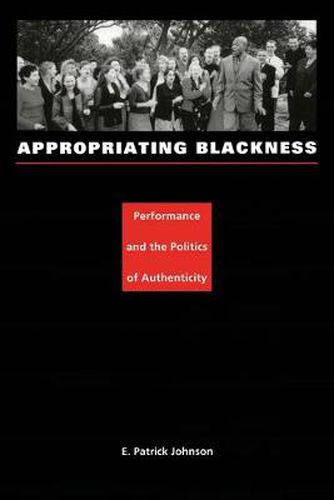Readings Newsletter
Become a Readings Member to make your shopping experience even easier.
Sign in or sign up for free!
You’re not far away from qualifying for FREE standard shipping within Australia
You’ve qualified for FREE standard shipping within Australia
The cart is loading…






Performance artist and scholar E. Patrick Johnson’s provocative study examines the various ways that blackness is appropriated and performed - toward widely divergent ends - both within and outside African American culture. Appropriating Blackness develops from the contention that blackness in the United States is necessarily a politicized identity trope - avowed and disavowed, attractive and repellant, fixed and malleable. Drawing on performance theory, queer studies, literary analysis, film criticism, and ethnographic fieldwork, he describes how diverse constituencies persistently try to prescribe the boundaries of authentic blackness and how performance highlights the futility of such enterprises. Considering how the politics of authentic identity are appropriated, Johnson looks at six specific sites of performed blackness: Marlon Riggs’s influential documentary Black Is…Black Ain’t ; nationalist writings by Amiri Baraka and Eldridge Cleaver and comedic routines by Eddie Murphy, David Alan Grier, and Damon Wayans; the vernacular of black gay culture; an oral history of a domestic worker in the South; gospel music as performed by a white Australian choir; and students in a performance studies classroom. By exploring the divergent aims and effects of these performances - which range from resisting racism, sexism, and homophobia to excluding sexual dissidents from the black community - Johnson deftly analyzes the multiple significations of blackness and their myriad political implications. His reflexive account considers his own complicity, as ethnographer and teacher, in authenticating narratives of blackness.
$9.00 standard shipping within Australia
FREE standard shipping within Australia for orders over $100.00
Express & International shipping calculated at checkout
Performance artist and scholar E. Patrick Johnson’s provocative study examines the various ways that blackness is appropriated and performed - toward widely divergent ends - both within and outside African American culture. Appropriating Blackness develops from the contention that blackness in the United States is necessarily a politicized identity trope - avowed and disavowed, attractive and repellant, fixed and malleable. Drawing on performance theory, queer studies, literary analysis, film criticism, and ethnographic fieldwork, he describes how diverse constituencies persistently try to prescribe the boundaries of authentic blackness and how performance highlights the futility of such enterprises. Considering how the politics of authentic identity are appropriated, Johnson looks at six specific sites of performed blackness: Marlon Riggs’s influential documentary Black Is…Black Ain’t ; nationalist writings by Amiri Baraka and Eldridge Cleaver and comedic routines by Eddie Murphy, David Alan Grier, and Damon Wayans; the vernacular of black gay culture; an oral history of a domestic worker in the South; gospel music as performed by a white Australian choir; and students in a performance studies classroom. By exploring the divergent aims and effects of these performances - which range from resisting racism, sexism, and homophobia to excluding sexual dissidents from the black community - Johnson deftly analyzes the multiple significations of blackness and their myriad political implications. His reflexive account considers his own complicity, as ethnographer and teacher, in authenticating narratives of blackness.